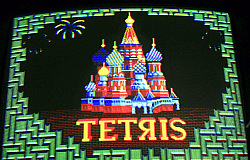The product, "Tetris," turned 25 on Saturday.
Alexei Pazhitnov was 29 and working for the Moscow Academy of Sciences when he completed "Tetris" on June 6, 1984, for a Soviet computer system called the Elektronika.
A computer programmer by day who researched artificial intelligence and automatic speech recognition, Pazhitnov worked on the game in his spare time.
"All my life I liked puzzles, mathematical riddles and diversion," Pazhitnov said in a recent interview from Moscow.
"Tetris," he said, was just one of the games he made back then. The others are mostly long forgotten.
"Tetris" stands out as one of the rare cultural products to come west from the Soviet Union during the Cold War. And the addictive rhythm of its task-by-task race against time was an early sign of the inbox-clearing, Twitter-updating, BlackBerry-thumbing world to come. In "Tetris," players flip shapes made up of four connected squares and fit them into orderly patterns as they descend, faster and faster as the game goes on.
 Mark Lennihan / AP Tetris has drawn praise for its complexity and "mathematical elegance." | |
Years of legal wrangling followed, with several companies claiming pieces of the "Tetris" pie -- for handheld systems, computers and arcades. Complicating matters, the Soviet Union did not allow privately held businesses. The Soviet state held the "Tetris" licensing rights, and Pazhitnov had no claim to the profits. He didn't fight it.
"Basically, at the moment I realized I wanted this game to be published, I understood that Soviet power will either help me or never let it happen," he said.
It wasn't until 1996 that Pazhitnov got licensing rights.
Asked whether he made enough money off the game to live comfortably, he said yes but offers no more details. Today, he is part owner of Tetris Co., which manages the game's licenses worldwide.
"Tetris" is easy to pick up. Rotate the falling shapes so that you form full lines at the bottom of the screen. Fit the shapes so there are as few open spaces left as possible. Aim for a Tetris: four lines completed in one swoop. Repeat. Watch your score zoom.
But Tetris is hard to master. Because the shapes -- technically known as tetrominoes -- come in a random order, it is hard to predict the best way to organize them so that they can form neat rows.
In fact, in 2002, Massachusetts Institute of Technology researchers determined that the potential combinations are so numerous that it would be impossible even for a computer to calculate the best place to put each falling shape. Erik Demaine, an associate professor of computer science, praised the game's "mathematical elegance," which perhaps stems from the background of its developer.
 For MT Pazhitnov | |
The solution was "Tetris" -- though Nintendo needed help from Henk Rogers, a U.S. entrepreneur. Rogers had spotted "Tetris" at the International Consumer Electronics Show in Las Vegas and bought the rights to a PC version of the game in Japan from Spectrum HoloByte. In February 1989, he went to Moscow on a tourist visa to try to get the rights for Nintendo. He spent his first day in a taxi with a driver who didn't speak English, communicating by gestures and trying in vain to find the ministry of software and hardware export. The next morning, he hired an interpreter and things went more smoothly, and "Tetris" got bundled into the first Game Boy.
Since then, "Tetris" has expanded to all kinds of devices and inspired a generation of knockoffs. Tetris Co. says 125 million copies have been sold in various incarnations.
Pazhitnov says "Tetris" could stick around another quarter-century.
"I hope so, why not?" he said. "Technology changes a lot, but I can't say people change a lot."
A Message from The Moscow Times:
Dear readers,
We are facing unprecedented challenges. Russia's Prosecutor General's Office has designated The Moscow Times as an "undesirable" organization, criminalizing our work and putting our staff at risk of prosecution. This follows our earlier unjust labeling as a "foreign agent."
These actions are direct attempts to silence independent journalism in Russia. The authorities claim our work "discredits the decisions of the Russian leadership." We see things differently: we strive to provide accurate, unbiased reporting on Russia.
We, the journalists of The Moscow Times, refuse to be silenced. But to continue our work, we need your help.
Your support, no matter how small, makes a world of difference. If you can, please support us monthly starting from just $2. It's quick to set up, and every contribution makes a significant impact.
By supporting The Moscow Times, you're defending open, independent journalism in the face of repression. Thank you for standing with us.
Remind me later.






